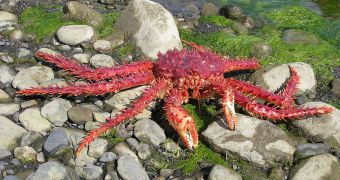A new study focusing on the way that the temperature of the Southern Ocean could influence the distribution of king crabs, concluded that if the coldest waters on Earth warm up, this could trigger an invasion of voracious predatory crabs, which will threaten the unique continental-shelf ecosystems of Antarctica.
King crabs are cold-blooded creatures, which means that their body's temperature is highly determined by that of the environment surrounding them.
The unexpected thing is that even if king crabs live in cold, deep-sea environments, research has shown that their larvae have developing problems if they are exposed to waters below half of a degree Celsius, even if it is a very brief exposure.
Dr Sven Thatje, an evolutionary ecologist at the University of Southampton's School of Ocean and Earth Science (SOES), based at the National Oceanography Center in Southampton, said that they have “tested the hypothesis that the king crab species of the Southern Ocean only thrive above a critical minimum temperature and that it is this thermal barrier that determines their bio-geographical distributions in the Southern Ocean.
“King crabs are ecologically important predators and form the basis of economically significant commercial fisheries.”
Thatje and graduate student Sally Hall studied the distributions of king crab species in the Southern Ocean, depending on water temperature.
They analyzed the distribution of 17 species of king crab, which lived at depths between 550 and 1600 meters, in the Southern Ocean.
They gathered data from several other sources, like published records, museum collections, commercial fishing records, and reports from scientific research cruises, which they compared to water temperatures from a range of relevant depths and geographical latitudes.
The results matched their theory: king crabs prefer rather warm waters, and the coldest waters in which king crabs have been found were those of the Ross Sea, with 0.4 – 0.5°C.
After this, the researchers concluded that there was actually a thermal barrier that was limiting king crab distributions.
What this also means, is that a slight increase in water temperature because of global warming could get king crabs to move into new areas, which would have serious ecological consequences, because king crabs are voracious predators.
And as kings crabs as well as their potentially competing predators such as sharks and rays and other predatory crustaceans are largely absent on the high-Antarctic continental shelves, this “could threaten isolated shelf communities such as those of the Bellingshausen Sea on the west side of the Antarctic Peninsula,” Hall said.

 14 DAY TRIAL //
14 DAY TRIAL //